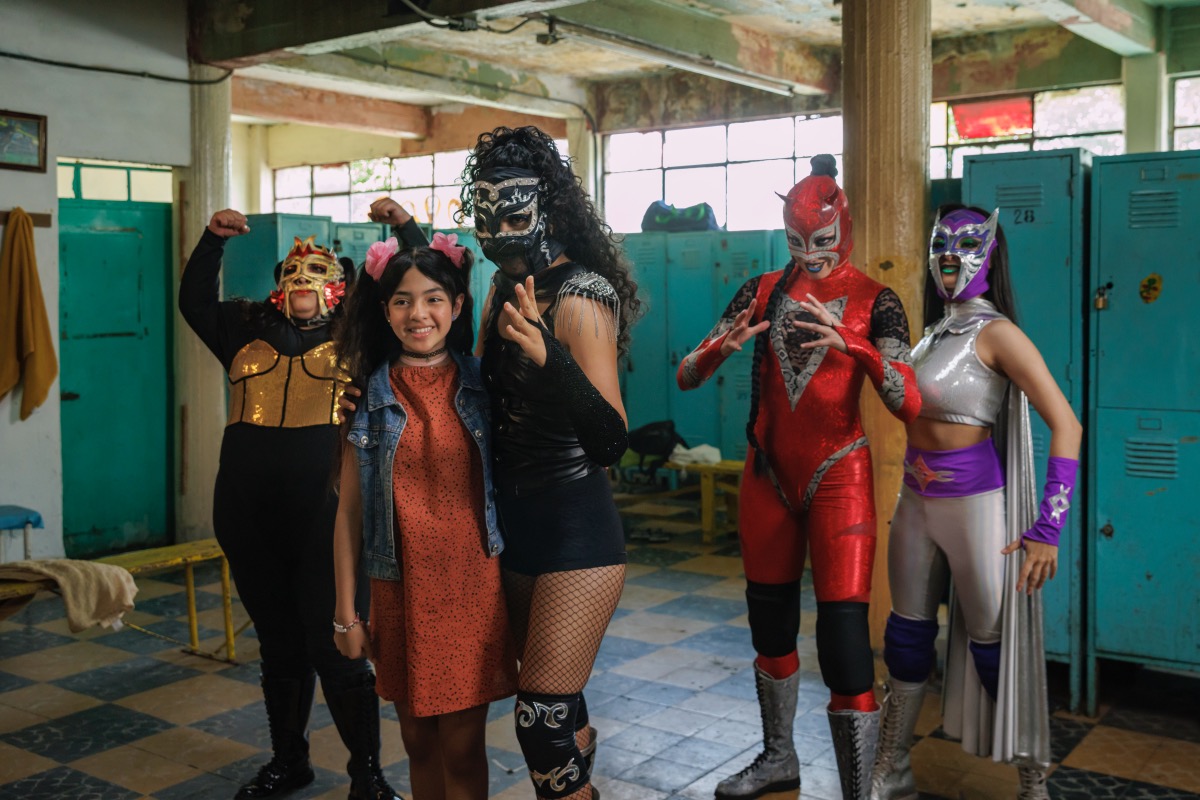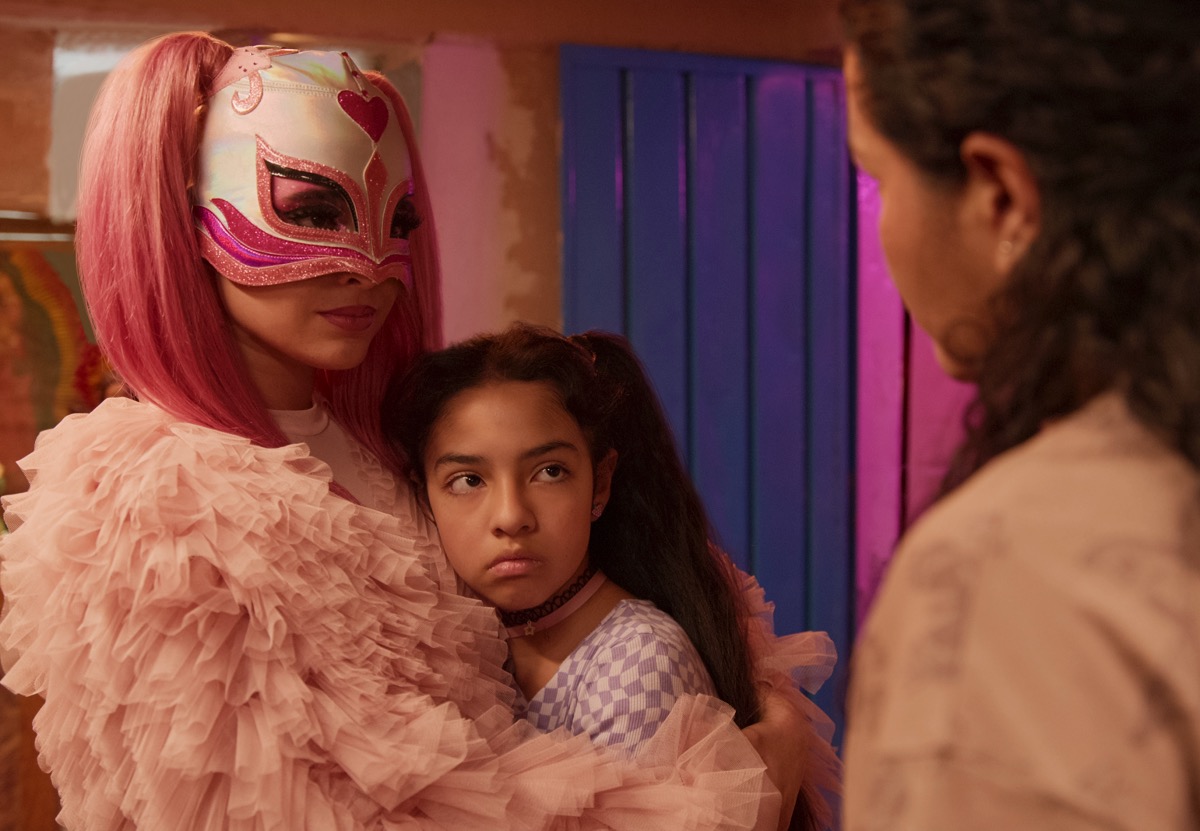

From left to right, Michelle Rodríguez, Alisson Santiago, Caraly Sánchez, María Balam, Valentina Buzzurro in Netflix’s ‘Against the Ropes” (Brenda Islas/Netflix)
Netflix’s Against the Ropes (Contra las cuerdas) is an unlikely love story. We’re talking a woman-centered wrestling show that’s primarily about the relationship between a mother and her 12-year-old daughter, plus a maximalist show that packs in a lot of elements at that—not just lucha libre wrestling, but also a drug ring, a bridal shop workplace, multiple romance plots, and more.
Against the Ropes makes it all work by never losing sight of the emotional stakes at hand.
But first, the fun. Against the Ropes is a brightly colored joyride. Each of its 10 episodes features at least one lucha libre fight, always between women, complete with outrageous costumes, over-the-top moves, and compelling backstories.
Here’s the premise: Ángela (Caraly Sánchez) returns home after six years in prison for a crime she didn’t commit. Yes, she wants to prove her innocence, but mostly she just wants her daughter Rocío (Alisson Santiago) to love, respect, and need her again.
Making up for lost time proves hard. So when Ángela finds out she has to compete against her ex’s lucha-champion girlfriend Dulce (Scarlet Gruber), Ángela decides an alter ego is in order. She becomes “La Novia Negra,” a ruda or wrestling villain, training in secret with an old family friend and eventually bringing to the ring her all-female co-workers at a local bridal shop.
Forming a lucha girl gang, the bridal shop crew shows how women of all hues, body types, social classes, sexualities, and temperaments can find power in physicality. Michelle Rodríguez as Josefina transforms over the course of the season from a beleaguered wife to a woman in charge. Likewise, Valentina Buzzorro as Lucia finds the power to stop hiding and go after what she wants, whether romantically as a lesbian or professionally as an attorney.
Ángela’s journey is less straightforward. La Novia Negra gives her a path to connect with her daughter and some much-needed purpose, but it also drives her to take undue risks, potentially undermining her long-term goals.
For Dulce, the role of lucha is even less clear. When we meet her, she seems to have everything Ángela could want: She’s a lucha libre champion, in a seemingly functioning relationship with Ángela’s ex, and has a great connection with Rocío.
But instead of becoming allies, these two become enemies. This is the one place I ding Against the Ropes, in that it dips into the trope of women as natural competitors.
But here’s the thing, almost ALL of the characters in the show are women or girls. The wrestlers are all women. The co-workers. The cops. Tthere are a couple of men, but they pretty much exist to serve as love interests, the helper characters we’re used to seeing women —and people of color— play.
Now, I’m not saying all shows should be like this, but it is a refreshing contrast. And Against the Ropes’ multitude of women show that as a gender, we are in fact diverse—not all good, bad, or indifferent. That’s why Dulce as the villain gets a pass from me.
I’m also hoping that in the second season Dulce gets some rehabilitation as we learn more about her motivations. Because the real enemy here should be the drug dealers that got Ángela in trouble in the first place and the lucha coaches that would rig the system against her.


Scarlet Gruber, left, and Alisson Santiago in Netflix’s ‘Against the Ropes’ (Brenda Islas/Netflix)
Still, this season works because the tension between Rocío and Ángela is so relatable, the needs of the daughter and the mother struggling to meet them presenting us multiple points of entry. Their relationship ties the whole thing together, giving real emotional stakes to what would otherwise be just a silly show.
And that depth makes Against the Ropes a different sort of portrayal of Mexican women than we’re used to seeing. Ángela, her family, and her friends are powerful, complex, funny people. They go on wild adventures, connect with each other, grow, and learn. They also look great in spandex, body-slamming their opponents.
That’s the type of representation we should all get!
***
A writer and activist, Cristina Escobar is the co-founder of latinamedia.co, uplifting Latina and gender non-conforming Latinx perspectives in media. She’s a member of the Latino Entertainment Journalists Association and writes at the intersection of race, gender, and pop culture. Twitter: @cescobarandrade


